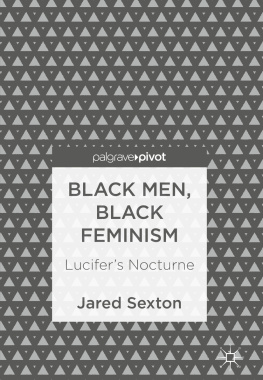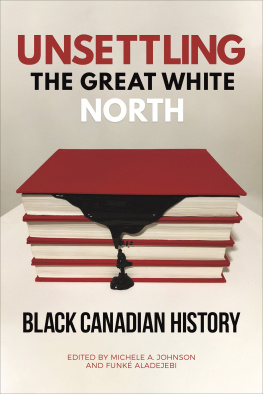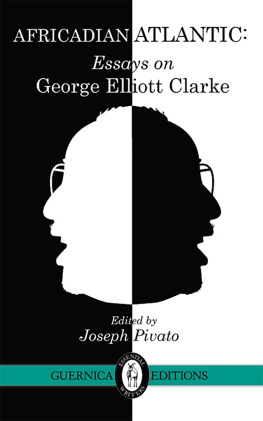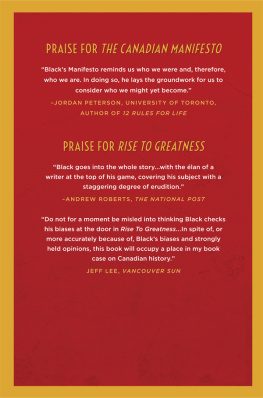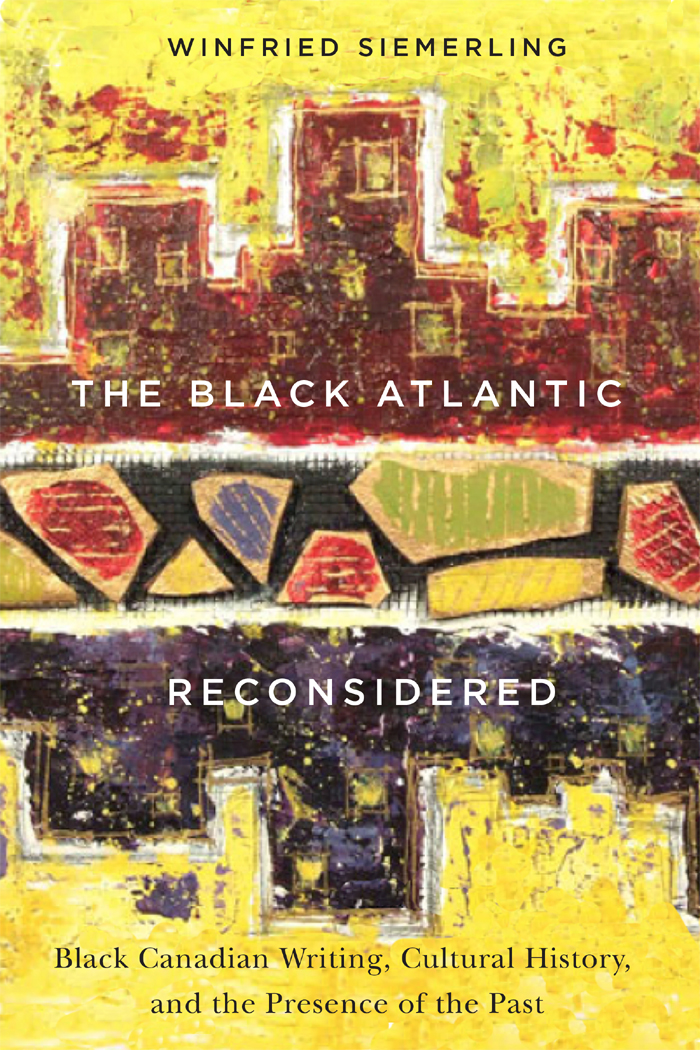THE BLACK ATLANTIC RECONSIDERED
THE BLACK ATLANTIC RECONSIDERED
Black Canadian Writing, Cultural History, and the Presence of the Past
WINFRIED SIEMERLING
McGill-Queens University Press
Montreal & Kingston | London | Ithaca
McGill-Queens University Press 2015
ISBN 978-0-7735-4507-6 (cloth)
ISBN 978-0-7735-4508-3 (paper)
ISBN 978-0-7735-8187-6 (ePDF)
ISBN 978-0-7735-8213-2 (ePUB)
Legal deposit second quarter 2015
Bibliothque nationale du Qubec
Printed in Canada on acid-free paper that is 100% ancient forest free (100% post-consumer recycled), processed chlorine free
This book has been published with the help of a grant from the Canadian Federation for the Humanities and Social Sciences, through the Awards to Scholarly Publications Program, using funds provided by the Social Sciences and Humanities Research Council of Canada.
McGill-Queens University Press acknowledges the support of the Canada Council for the Arts for our publishing program. We also acknowledge the financial support of the Government of Canada through the Canada Book Fund for our publishing activities.
LIBRARY AND ARCHIVES CANADA CATALOGUING IN PUBLICATION
Siemerling, Winfried, author
The black Atlantic reconsidered : Black Canadian writing, cultural history, and the
presence of the past / Winfried Siemerling.
Includes bibliographical references and index.
Issued in print and electronic formats.
ISBN 978-0-7735-4507-6 (bound).ISBN 978-0-7735-4508-3 (pbk.).
ISBN 978-0-7735-8187-6 (ePDF).ISBN 978-0-7735-8213-2 (ePUB)
1. Canadian literature Black Canadian authors History and criticism. 2. Canadian literature History and criticism. 3. Blacks in literature. 4. Culture in literature. 5. History in literature. 6. Transnationalism in literature. I. Title.
PS8089.5.B5S53 2015 C810.9896071 C2014-908224-X
C2014-908225-8
Set in 10.5/13.5 Minion Pro with Gotham
Book design & typesetting by Garet Markvoort, zijn digital
For Juanita De Barros
and for Henry Felix and Linus
CONTENTS
CHAPTER 1
Introduction: Modernity and Canadian Time-Spaces of the Black Atlantic
PART I
EARLY TESTIMONY AND THE BLACK CANADIAN NINETEENTH CENTURY
CHAPTER 2
Slavery and Early Black Canadian Writing
CHAPTER 3
The Black Canadian Nineteenth Century
PART II
THE PRESENCE OF THE PAST
CHAPTER 4
Slavery, the Black Canadian Nineteenth Century, and Caribbean Contexts in Contemporary Black Canadian Writing
CHAPTER 5
Other Black Canadas
CHAPTER 6
Coda: Other Canadas, Other Americas, the Black Atlantic Reconsidered
PREFACE
When I first immersed myself in contemporary black Canadian writing as well as earlier texts and testimony, I was surprised to learn that this important aspect of Canadian culture had not received more attention. Why had this material not been more central to previous literary theory and discussion in Canada? And why was it so conspicuously absent from diasporic critical conversations about the black Atlantic?
Some of the reasons will become apparent in this books introductory chapter. Fortunately, a number of researchers have augmented the relevant scholarship since I first undertook my own project. This volume builds on their insights and discoveries in addition to the efforts of some critics, theorists, sociologists, and historians who were earlier pioneers in the field. The main purpose of this book is to contribute to the task of making the fascinating and rich body of black Canadian writing available to a much wider readership and for more extensive contexts of discussion. The plan for this work has been to bring together in one place a critical account of black writing in what is now Canada from its beginnings to the present, to place this material in its diasporic black Atlantic and hemispheric contexts, and to include both anglophone and francophone perspectives.
As a result, The Black Atlantic Reconsidered is a multi-dimensional study that can be read and used in many ways. Since this account argues for a close link between past and present and for an appreciation of the value of relational connections, I hope that you will read it in its entirety. Most of the material covered in this study, for instance, would seem relevant for courses in black Canadian cultural studies or Canadian literature and culture. Some courses, discussion groups, or scholars, however, might use the volume as background reading while focusing on particular sections in related contexts. A more general introduction to North American literature and culture, a period course, or an introduction to the black Atlantic, for example, might rely on this book to provide necessary contexts while foregrounding specific chapters in juxtaposition with other materials. The same strategy might work for courses in diaspora, postcolonial, border, and hemispheric studies, or in critical regionalism.
In my previous monograph, The New North American Studies, I used multiple areas of literary and cultural studies in comparative ways to explore North American cultural emergence. To understand the relationship between normative recognition and alternative, emergent recognition, I worked through theoretical issues related to W.E.B. Du Boiss concept of double consciousness and his ideas about race. While the study covered a wide range of materials, it was thus also very much concerned with literary and cultural theory. The present volume is again wide-ranging across diverse transnational black Canadas and engages many important theoretical issues, especially around forms of memory and the social and narrative production of time and space. I have moved some of the theoretical discussions, however, into endnotes and have tried to avoid overly specialized language. The aim has been to keep the text as readable as possible while providing additional information in the notes.
For quick orientation, the appendix presents a dual timeline with works organized by year and author. Given the sheer wealth of material, this timeline cannot possibly be exhaustive but is meant to provide context for the works discussed. It is important to note that many of the earlier works, especially the slave narratives and other sources discussed in .
Toronto, November 2014
ACKNOWLEDGMENTS
My thanks go out to many friends and colleagues as well as the institutions and archives that have facilitated my research and helped to make this volume possible. Since accessibility is so important, McGill- Queens University Press deserves my gratitude for making the book available not only in hardcover but also in a simultaneous paperback edition and at a reasonable price. McGill-Queens is a good home for this volume because it has published other important books in the field (for instance, texts by Robin Winks and Frank Mackey). I previously benefited from the editorial wisdom of Kyla Madden when working on Canada and Its Americas, and I would like to thank her again for her unstinting support and patience, as well as copy editor Judith Turnbull for her careful and precise work on the manuscript and managing editor Ryan Van Huijstee for seeing it through production. The outstanding research assistance of Jay Rawding was invaluable in the latter stages of this project, and the equally excellent work of Joanna Daxell and Marie-France Lafaille was helpful earlier on. Another factor that often remains invisible is the time-consuming and demanding work of anonymous readers who vet and critique book proposals and completed manuscripts. Three anonymous readers offered detailed evaluations for the Award to Scholarly Publication Program (ASPP), which subsequently supported the book with a generous publication grant. I also benefited from readers comments that helped me receive two standard research grants from the Social Sciences and Humanities Research Council of Canada (SSHRC) in 200509 and 201115; these grants made much of the archival and other research for this volume possible. Further useful comments came from anonymous evaluators for the Killam Research Fellowship, which placed the project on its 3 Alternates list in 2008 (and thus among the top thirteen applications in a national competition across all disciplines). Thanks also to three readers who prepared instructive and .


